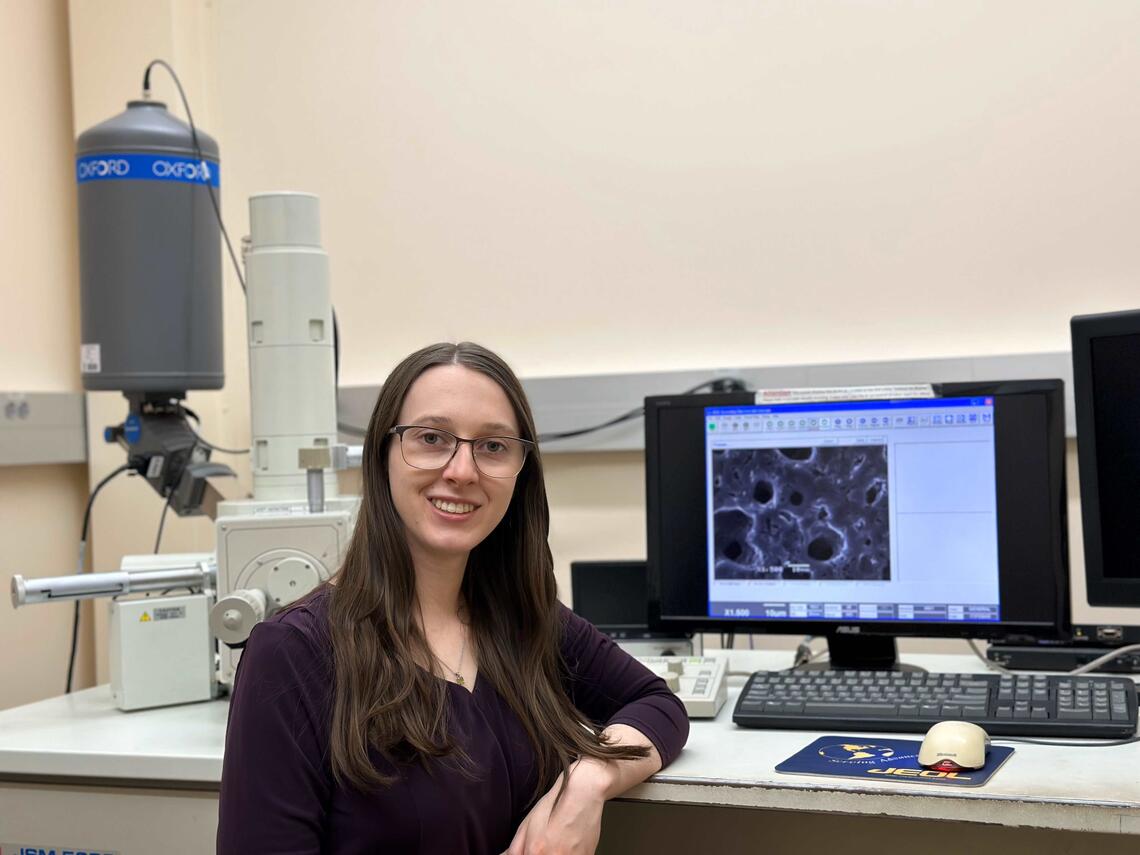
Emma Letourneau, a UNLV mechanical engineering graduate student, uses a scanning electron microscope to examine the surface morphology and pore structure of biochar samples, which are smaller than most grains of sand.
UNLV College of Engineering graduate student Emma Letourneau is among 32 scholars nationwide awarded a prestigious Tau Beta Pi Fellowship for the 2023-24 academic year.
The fellowship, awarded to only about 10% of applicants each year, comes with a $10,000 stipend for advanced study. The oldest engineering honor society, Tau Beta Pi has awarded nearly 1,800 fellowships since the program began in 1929.
“I certainly hope that I can be a good example for other women who are considering pursuing STEM, or becoming an engineer,” Letourneau said. “I know that imposter syndrome among women scientists is real, and feeling nervous to reach out for your goals is something we can struggle with. I hope women can look at things like this and think, ‘maybe I’m qualified enough to try this too.’ You have to apply to all the opportunities you can and keep trying until you succeed.”
Letourneau, who earned her bachelor’s degree in mechanical engineering from UNLV in 2022, decided to continue with graduate studies at the university thanks in part to the experiential learning and research opportunities she actively pursued while an undergraduate student in the College of Engineering.
Working in the Energy and Environmental Materials Lab led by UNLV engineering professor Jaeyun Moon, Letourneau sought environmentally friendly and less costly ways — through the use of filtering materials — to remove contamination from the water and air.
She’s continuing that work today as a graduate research assistant in Moon’s lab. Their research centers around biochar — a charcoal-like substance created in the lab from agricultural waste materials like peanut shells or rice husks. After the biochar is made, Letourneau is able to modify it with various chemicals to enhance its adsorption efficiency. That process better enables the biochar to capture and filter pollutants out of the water, including metals like lead, or chemical compounds like trichloroethylene (TCE) or carbon dioxide.
TCE, an industrial waste product, is at the center of Letourneau’s work. She’s studying ways to use biochar to remove TCE from groundwater as part of a project funded by the Savannah River National Laboratory.
“TCE is one of the contaminants that is most prevalent in the water sources by their facilities,” Letourneau said. “It’s an industrial waste product and a carcinogen. It sits in the groundwater and it’s hard to remove.”
In addition to her strong academic record and her involvement in extracurricular activities at UNLV, Letourneau’s work in Dr. Moon’s lab was a key reason she achieved the highly competitive Tau Beta Pi fellowship.
“I was up against a lot of very talented and skilled people who submitted applications, so I was very excited that I was selected,” she said.
The fellowship will enable her to continue her research over the next year of her master’s degree, but not before she spends the summer as an intern at the Argonne National Laboratory.
“Emma is an absolute rock star,” said Melissa Morris, faculty advisor for the UNLV student chapter of Tau Beta Pi. “She exemplifies the best of Tau Beta Pi and our mechanical engineering program at UNLV. This fellowship is well-deserved, and a testament to the impressive research Emma is involved in and will continue to pursue while at UNLV.”